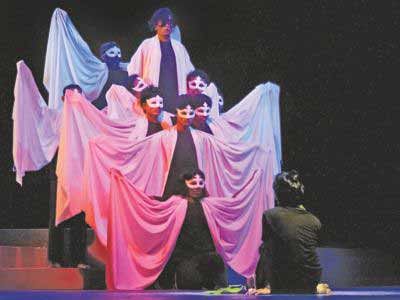Tarok

Symbolic use of masks in the play was apt. Photo: Jamil Mahmud
Two nocturnal birds are talking to each other. They suddenly see a group of people digging a grave. As one bird asks the other about it, a story unfolds -- zooming in on an individual named Kabir.
The play “Tarok” -- on the life of Kabir, an individual belonging to the sexual minority group -- was staged at the National Theatre Hall, Bangladesh Shilpakala Academy, on June 6.
Bengal Foundation has produced the 50-minute play that was staged by the group Shamparker Noya Shetu (SNS). Rafiqul Islam wrote the play, borrowing elements from daily lives of the members of the group. Anisul Haque who adapted and directed it considered it “challenging”.
The play unfolds as the mythical talking birds narrate Kabir's story. They talk about the world below and mankind.
Born as a male child, Kabir is forced to face his 'anomalies' as he grows older. From there begins a ruthless cycle of discrimination, humiliation and victimisation. Kabir's eventual induction into a guru's safe haven and its cheap glitters cannot make his life better.
The play might not be aesthetically or artistically rich, but it aptly conveyed the necessary message. Symbolic use of masks was apt.
The cast included amateur actors -- Md. Rafiqul Islam, Kajol Howladar, Mustafizur Rahman, Jihad, Hridoy, Al-Amin, Mintu, Billal, Sohel, Shohag and Md. Ripon. Nasirul Haque Khokon designed the light, while Komol Khalid worked on the musical scores.
A 10-minutre documentary on the making of the play was screened prior to the show.
Luva Nahid Chowdhury, director general of Bengal Foundation, explained the reason behind this initiative. She said that it was part of their efforts to connect people with the practice of arts and to make room for cultural expressions. Human rights activist Khushi Kabir, among others, spoke at the programme.
Joya Shikdar, president of SNS, said that they wanted to share their agony and woes with a broader section of the society. But insensitivity still reigns supreme. During a scene where Kabir meets others like him for the first time, a section of the audience were laughing, as if it was something entertaining.
The disheartened look on Joya's face said a thousand words.

 For all latest news, follow The Daily Star's Google News channel.
For all latest news, follow The Daily Star's Google News channel. 



Comments